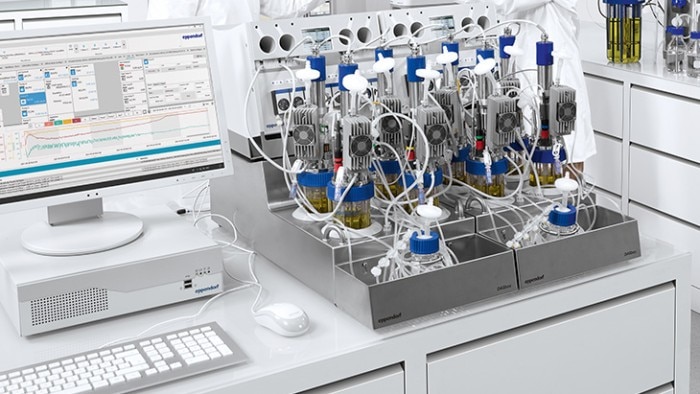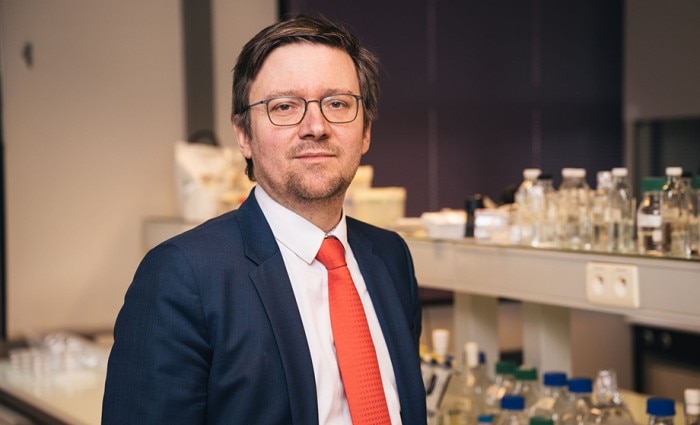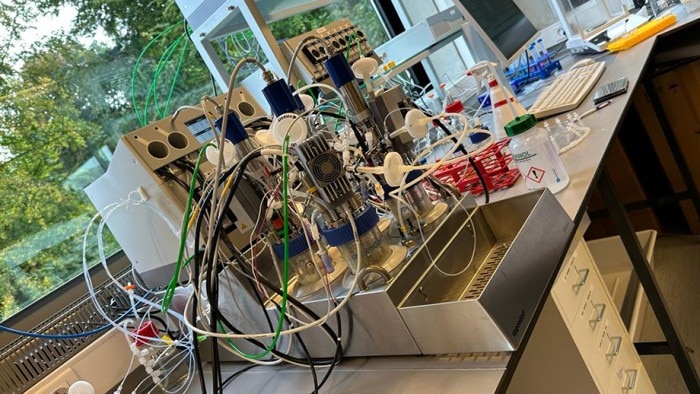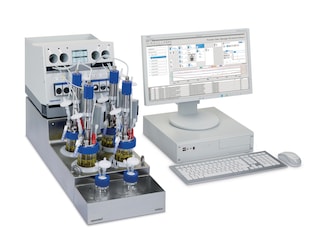MENU
AR | ARS
AR | ARS
You are about to leave this site.
Please be aware that your current cart is not saved yet and cannot be restored on the new site nor when you come back. If you want to save your cart please login in into your account.
myEppendorf
No results found
Search Suggestions

Precision fermentation: Making meat molecules in bioreactors
Lab Academy
- Bioprocessing
- Food & Beverage
- Essay
Paleo BV is a B2B food technology company with a portfolio of heme proteins. In this interview, their CEO Hermes Sanctorum explains how parallel bioreactors help them save time and money when developing precision fermentation processes for the production of meat compounds.
Q: What is the mission of Paleo?
HS: At Paleo, we make meat compounds without using animals. Why? Because we can no longer look away from the impact of holding massive amounts of livestock, now that demand for meat skyrockets in the 21st century. It accounts for several gigatons of greenhouse gasses and billions of animals killed, year after year.
At Paleo, we want everyone to be able to continue to enjoy meat. Therefore, we return to the roots of what it means to eat meat. Quite literally to the molecules of meat. Through a process of fermentation, Paleo delivers products that are identical to animal meat on a molecular level. In this way, we develop meat compounds without using animals.
Adding our product onto a non-conventional meat product, means as much as adding the taste, texture, color and nutritional value of animal meat. By commercializing our products, we enable food manufacturers to create the meat or fish experience their end-consumer is looking for.
HS: At Paleo, we make meat compounds without using animals. Why? Because we can no longer look away from the impact of holding massive amounts of livestock, now that demand for meat skyrockets in the 21st century. It accounts for several gigatons of greenhouse gasses and billions of animals killed, year after year.
At Paleo, we want everyone to be able to continue to enjoy meat. Therefore, we return to the roots of what it means to eat meat. Quite literally to the molecules of meat. Through a process of fermentation, Paleo delivers products that are identical to animal meat on a molecular level. In this way, we develop meat compounds without using animals.
Adding our product onto a non-conventional meat product, means as much as adding the taste, texture, color and nutritional value of animal meat. By commercializing our products, we enable food manufacturers to create the meat or fish experience their end-consumer is looking for.
Read more
Read less

Hermes Sanctorum, CEO of Paleo
Q: Which important developments do you see in the field of meat alternatives?
HS: I truly believe the market of meat alternatives finds itself at a tipping point. Will we finally be able to produce a product that convinces a critical mass of consumers? Research shows that the battle will be won on taste and price. The sector needs to deliver a meat-like taste, for a meat-like price (or better). And this is precisely what Paleo wants to help businesses with.
First of all our product makes meat alternatives taste like conventional meat. This shouldn’t come as a surprise, since you add compounds that are identical to the real deal, even if they don’t originally stem from the same source. Second of all our product is cost-effective. It’s a small ingredient to add, yet it has a high impact on the taste of your final product (and on other values).
Q: For which applications do you use your Eppendorf bioreactor system? What challenges does it help you to overcome?
HS: At Paleo, we chose the Eppendorf bioreactor system for our precision fermentation of yeast cells. We also use it to compare different yeast strains and select the best producers.
Eppendorf’s system allows us to simultaneously test different settings. In this way, we gain significant amounts of time in our research and development phase. And time is money. This is especially true for very competitive sectors like ours.The reason we selected this specific system is because it allows us to test multiple parameters at a small scale and hence at a small cost. We then rely on the information we obtain through the system when moving to a larger scale.
HS: I truly believe the market of meat alternatives finds itself at a tipping point. Will we finally be able to produce a product that convinces a critical mass of consumers? Research shows that the battle will be won on taste and price. The sector needs to deliver a meat-like taste, for a meat-like price (or better). And this is precisely what Paleo wants to help businesses with.
First of all our product makes meat alternatives taste like conventional meat. This shouldn’t come as a surprise, since you add compounds that are identical to the real deal, even if they don’t originally stem from the same source. Second of all our product is cost-effective. It’s a small ingredient to add, yet it has a high impact on the taste of your final product (and on other values).
Q: For which applications do you use your Eppendorf bioreactor system? What challenges does it help you to overcome?
HS: At Paleo, we chose the Eppendorf bioreactor system for our precision fermentation of yeast cells. We also use it to compare different yeast strains and select the best producers.
Eppendorf’s system allows us to simultaneously test different settings. In this way, we gain significant amounts of time in our research and development phase. And time is money. This is especially true for very competitive sectors like ours.The reason we selected this specific system is because it allows us to test multiple parameters at a small scale and hence at a small cost. We then rely on the information we obtain through the system when moving to a larger scale.
Read more
Read less

DASbox® Mini Bioreactor System at Paleo
Q: Do you already think about scaling up your bioprocess? Can you estimate what production volumes will be necessary in the future to meet market requirements?
HS: Of course, we are thinking about scaling up. In fact, since the very start of Paleo, we are building our process with the goal of upscaling in mind. This is what is needed for us to reach the stage of commercial production.
Therefore, in our lab, we aim to “scale down” and use unit operations and parameters that we know can be used for large fermentation and downstream processing. Again, this improves efficiency.
We already work very closely with third parties for the scale up and for industrial implementation of our myoglobin production process. In any case the volumes will be a multitude of what we’re working with today, we’re looking at multiple cubic meters.
Q: Why did you choose a bioreactor system from Eppendorf?
HS: The reason we chose for the Eppendorf DASbox® Mini Bioreactor System is twofold. First of all, as a start-up, we started off in a relatively small laboratory. We needed to start with a sober basis in terms of equipment and hoped to be able to expand as soon as possible. Eppendorf’s system allowed for that, since it is modular. Also, it has a small footprint, adapted to small laboratories. These are clear advantages for a growing company like ours.
Secondly, The Eppendorf system was independently recommended to us by several colleagues in Belgium and abroad. In searching for the best equipment, we depended on some trusted sources who were themselves very experienced with yeast fermentation scale up. Today, we’re happy to recommend the system ourselves.
Hermes Sanctorum was interviewed by Eppendorf in 2023.
HS: Of course, we are thinking about scaling up. In fact, since the very start of Paleo, we are building our process with the goal of upscaling in mind. This is what is needed for us to reach the stage of commercial production.
Therefore, in our lab, we aim to “scale down” and use unit operations and parameters that we know can be used for large fermentation and downstream processing. Again, this improves efficiency.
We already work very closely with third parties for the scale up and for industrial implementation of our myoglobin production process. In any case the volumes will be a multitude of what we’re working with today, we’re looking at multiple cubic meters.
Q: Why did you choose a bioreactor system from Eppendorf?
HS: The reason we chose for the Eppendorf DASbox® Mini Bioreactor System is twofold. First of all, as a start-up, we started off in a relatively small laboratory. We needed to start with a sober basis in terms of equipment and hoped to be able to expand as soon as possible. Eppendorf’s system allowed for that, since it is modular. Also, it has a small footprint, adapted to small laboratories. These are clear advantages for a growing company like ours.
Secondly, The Eppendorf system was independently recommended to us by several colleagues in Belgium and abroad. In searching for the best equipment, we depended on some trusted sources who were themselves very experienced with yeast fermentation scale up. Today, we’re happy to recommend the system ourselves.
Hermes Sanctorum was interviewed by Eppendorf in 2023.
Read more
Read less
Related links
Read more
Read less

